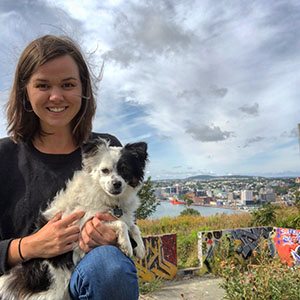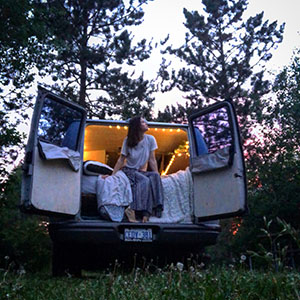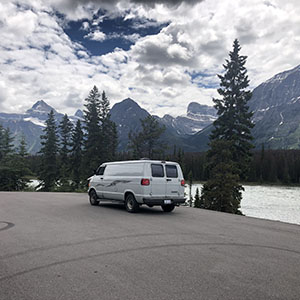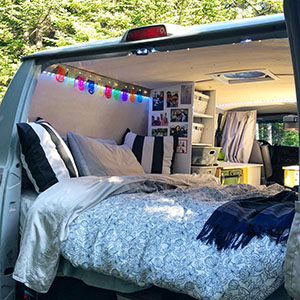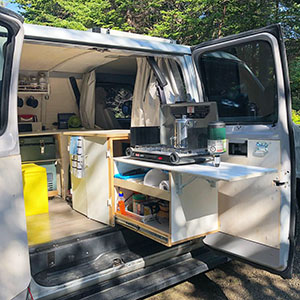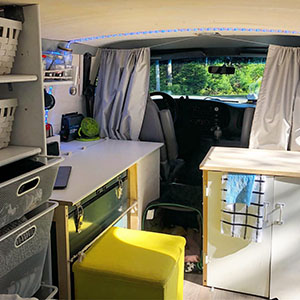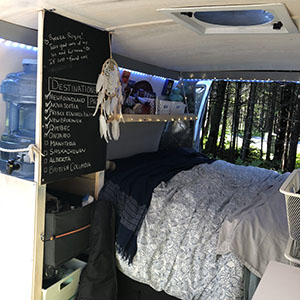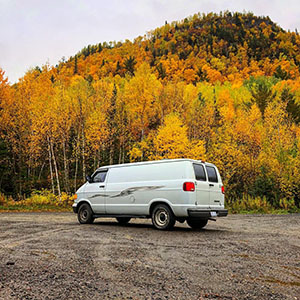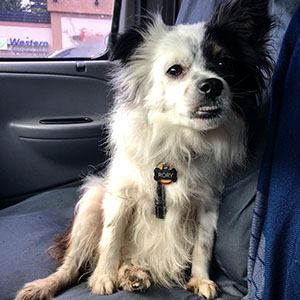With the COVID-19 pandemic requiring us to do our part to stay home and physically distance in order to combat the spread of the virus, a newfound hobby for many of us has been to daydream over future travel opportunities. To appeal to those engaging in wanderlust, we’d like to indulge you with the fascinating story of a local woman who embraced van-life to travel across Canada – pre-COVID-19 – while also providing her perspective on sustainability and energy usage.
In August 2018, 30-year old Sarah Patterson started her cross-country trek in a 1998 Dodge Ram cargo van named Rogue; having spent a year-and-a-half researching and planning for her journey.
It would take another five months to insulate, and customize the van’s interior with cabinets, a pull-out kitchen, wooden walls, and vinyl flooring. She also put a lot of thought into her electrical needs in order to travel and live as sustainably as possible.
Driving from Ottawa to St. John’s, Newfoundland to Tofino, British Columbia and then back to Ottawa, Sarah and her pup, Rory, experienced Canada’s natural beauty most of us will only ever dream of. Here, she shares the highs and the lows of her adventure, and what she learned along the way.
What was the inspiration for your journey?
Like many people in their late 20’s and early 30’s, I wasn’t totally happy with the life I was leading and wanted to live the hippy van-life I envied on Instagram. Turns out, reality is very different from social media…what a twist!
What was the purpose or goal that you set for yourself?
I wanted to challenge myself and my concept of life; to break my routine and carve out a new lifestyle for myself. Just the act of planning and building the van opened me up to all kinds of new skills and knowledge. The trip brought me to my breaking point and back, and it proved to me how capable, adaptive and resilient I could actually be. I am very proud of what I accomplished and the many little failures that taught me to challenge myself and grow from those experiences.
Was living sustainably a priority for you at the time?
Because of the type of budget I was working with, it was essential. I was as efficient as possible with my electricity usage, water supply, food and gas. It taught me how little I could actually live with and how excessively I had been living before.
What was it that drew you to the camper van lifestyle?
I loved traveling, and did a lot of backpacking in my 20’s. I had just gotten a pup a year before – a toy Australian shepherd named Rory – and I didn’t want to leave her behind on my next adventure. As much as I had seen other countries, I hadn’t seen much of Canada and I really wanted to see places like Newfoundland. I valued the freedom, independence and self-sufficiency that van-life would bring.
Tell us about your battery storage and solar power.
I really wanted to have an efficient power source since van builds can range from no power source to very expensive electrical set-ups. I ended up somewhere in the middle.
With only $5,000 to spend on my conversion materials, I bought two 6-volt external batteries, and with the help of a much more technically-savvy friend, attached a 100 amp battery isolator, 100 amp charge controller – complete with fuse box control – and a LED battery monitor. This allowed me to keep a close eye on the volts going in and out of my batteries and provided me with two options for recharging them. One option was through my transmission when the van was running, and the other was with a portable 150-watt solar panel I could set-up when I was camping.
This battery set-up allowed me to run my 2.1 cu ft AC/DC portable refrigerator/freezer, my 3-speed hood vent, my LED lights and my charge controller that I used to plug in my computer and cell phone.
I could run my power for about two full days before my volts would dip to around 11.90 volts and I would need to recharge.
How did your habits and energy usage change the more you adopted a camping lifestyle, and how did it compare to when you were living at home?
You end up becoming an essentialist; only buying and using what you need in the day, and planning out your week based on your consumption rate. I would live every day knowing how much water I had left, how much voltage I had in my batteries, what food was left, how much gas was in my tank and how many miles were left until the next gas station.
How was it travelling alone (except for Rory of course)? Any parallels to our current times of self-isolation?
I always thought I would enjoy the solitude, but in reality it was way too much alone time. I went from working full-time and converting the van in my spare time while hanging out with friends and family, to having an endless amount of time alone wandering around the country. On the bright side, it made me incredibly prepared for our current quarantine – and the absolute necessity of taking walks and practicing quieting your mind with meditation.
What are some key practices that you took away from your experience? How do they influence your home life today?
I definitely know my way around machines and tools. I try to refurbish and fix instead of replace, and I’ve never been more excited to have an apartment with a shower in it again. I will never take temperature control for granted again. The epitome of luxury is the ability to keep yourself comfortable and never getting too hot or too cold.
If you were to recommend three simple changes we could all make to adopt a “greener” lifestyle, what would they be?
- Insulate everything. I never understood how important that was until I spent a night in a minus 10-degree van with all my clothes on, cradling my pup under the covers to keep us warm.
- Solar panels are expensive, but when I buy a house I am investing in a whole roof of them.
- The best thing I bought for my van was a hood vent. Being able to push heat out of the van during the summer nights kept me alive more times than I could count.
What did you learn about yourself?
It’s going to be one of those corny lines at the end of an overly emotional movie, but by truly losing myself and taking away all my comforts, physically and mentally, I really found out what I was made of and who I wanted to be. Also, audio books are amazing and powering through all of Brené Brown’s books was the best therapy I could have paid for.
We hope that Sarah’s story not only strikes a chord over the many challenges you’ve been facing over isolation, but also inspires the hopes and dreams for future sustainable travel and road trips once the COVID-19 pandemic is behind us.
